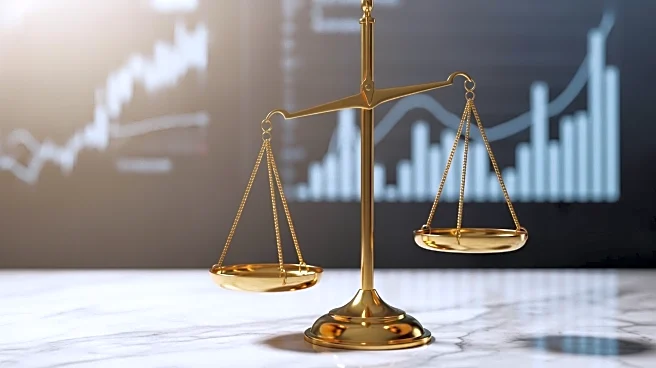What's Happening?
President Trump has declared that inflation is under control, citing a seven-month period of low inflation rates. However, economic experts and conventional measures suggest that inflation remains elevated,
partly due to tariffs imposed by the Trump administration. The consumer price index showed a 2.9% inflation rate in August, contradicting the White House's claim of a 2.3% rate. The administration's method of annualizing short-term data to project a full year of inflation is considered unusual by economists, who typically rely on annual comparisons. The Federal Reserve, responsible for managing inflation through interest rate policies, has noted that inflation is running above its target, with the personal consumption expenditures index at 2.7%. The Fed has recently cut interest rates and may do so again, focusing more on labor market concerns than tariff-induced inflation.
Why It's Important?
The discrepancy between President Trump's claims and economic data highlights ongoing debates about the impact of tariffs and inflation on the U.S. economy. While the White House points to increased factory investments as a sign of economic strength, the broader economic indicators suggest persistent inflationary pressures. This situation affects consumers, who may face higher prices, and businesses, which must navigate tariff costs. The Federal Reserve's actions to manage inflation through interest rate adjustments are crucial for maintaining economic stability. The administration's narrative of economic success may influence public perception and policy decisions, impacting future economic strategies and political discourse.
What's Next?
The release of September's inflation data, delayed due to a government shutdown, is expected soon and may provide further insights into the inflation trend. The Federal Reserve's upcoming interest rate decision will be closely watched as it seeks to balance inflation control with labor market stability. Businesses and consumers will continue to monitor tariff impacts, potentially adjusting strategies to mitigate costs. Political leaders may respond to the economic narrative, influencing policy debates and public opinion. The administration's focus on domestic production and investment may drive future economic policies, shaping the U.S. economic landscape.
Beyond the Headlines
The administration's approach to inflation measurement raises questions about transparency and the interpretation of economic data. The reliance on annualized estimates rather than traditional annual comparisons may obscure the true inflationary pressures faced by consumers. The broader implications of tariff policies on global trade relations and domestic economic health remain a critical area of analysis. The narrative of 'defeating inflation' may serve political purposes but requires careful scrutiny to ensure accurate public understanding and effective policy responses.









